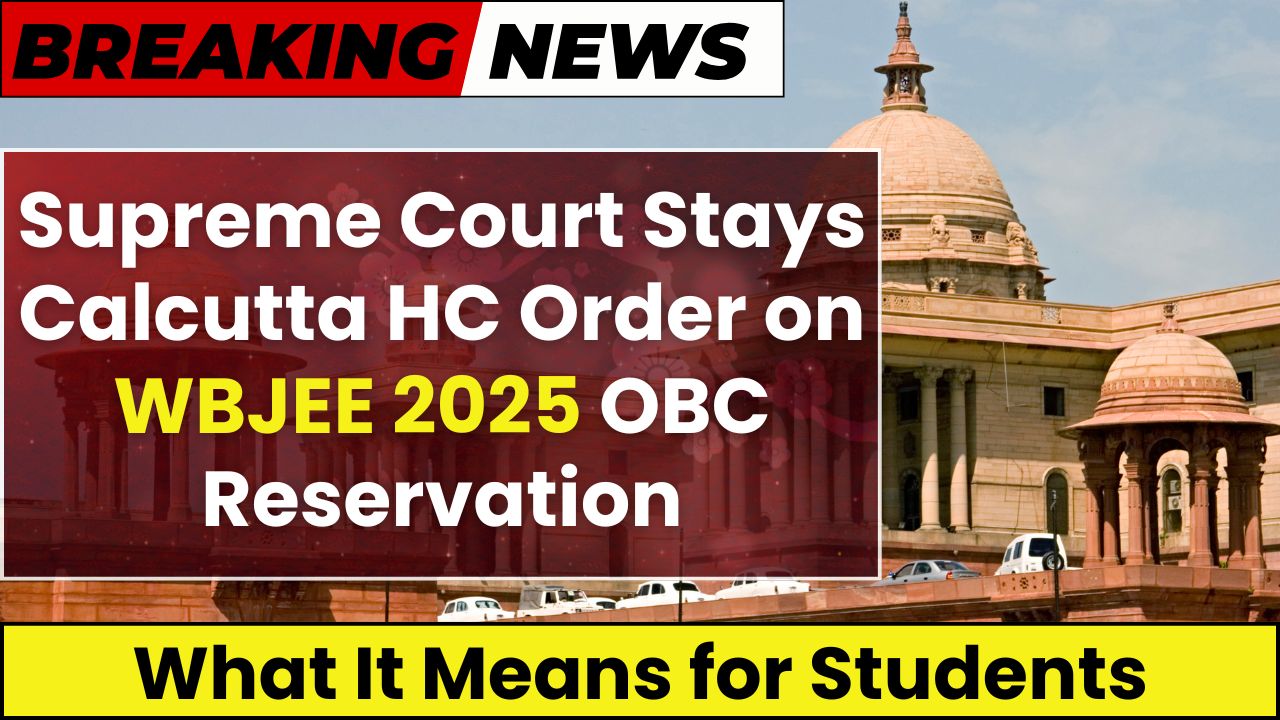WBJEE 2025: In a significant development, the Supreme Court of India on August 22, 2025 stayed the direction of the Calcutta High Court, which had earlier ordered the West Bengal Joint Entrance Examinations Board (WBJEEB) to recast the WBJEE 2025 merit list based on the pre-2010 OBC reservation percentage. This interim stay by the apex court effectively allows the declaration of results in line with the State’s new OBC reservation list, which was officially notified on June 10, 2025.
This move has brought immediate relief to thousands of students who were anxiously awaiting clarity over their admission prospects in the upcoming academic session.
Background: The OBC Reservation Dispute in West Bengal
The reservation system in West Bengal has witnessed continuous legal challenges over the years, especially concerning the inclusion and recognition of certain OBC categories.
- In May 2024, a Division Bench of the Calcutta High Court cancelled certain OBC-A and OBC-B certificates, citing irregularities in the process of issuance.
- In May 2025, the High Court passed an order instructing the WBJEE Board to follow the earlier framework of OBC reservations, which existed prior to 2010.
- On July 28, 2025, the Supreme Court temporarily kept the High Court’s order in abeyance, allowing the State to continue with the new OBC list.
Despite this, the Calcutta High Court, on August 7, 2025, expressed displeasure with the WBJEE 2025 Board for preparing the merit list in violation of its earlier direction and once again ordered the merit list to be re-prepared with only 7% OBC reservation, as per the pre-2010 system.
Supreme Court Intervention: Key Highlights
The case reached the Supreme Court after the State of West Bengal filed a petition against the Calcutta High Court’s impugned order. A bench comprising Chief Justice of India BR Gavai and Justice K Vinod Chandran heard the matter.
The Supreme Court:
- Issued a stay on the Calcutta High Court’s order to recast the WBJEE 2025 results.
- Allowed results to be declared as per the State’s new OBC list (June 2025 notification).
- Noted that the High Court’s directive had a sweeping effect, potentially reducing OBC reservations from 17% to 7%, thereby affecting thousands of students.
- Observed that the order violated constitutional provisions under Articles 15(5) and 16(4) and also contradicted the precedent set in Indra Sawhney v. Union of India (1992).
State Government’s Grounds of Appeal
The State of West Bengal argued that the High Court’s directive was legally unsustainable on several grounds:
- After the July 28 stay order of the Supreme Court, a fresh survey was conducted to assess the social status of candidates seeking OBC benefits.
- Only those students who uploaded their details and obtained valid OBC certificates under the new notification were considered eligible.
- The cancelled OBC certificates were not being used in any admission process, including JEMAS(PG) 2025.
- The High Court passed its order without giving the State an opportunity to be heard.
- The order had far-reaching implications that could affect all recruitment and selection processes in West Bengal.
Calcutta High Court’s Stand
Justice Kausik Chanda, in his August 7 order, strongly criticized the WBJEE Board for violating the earlier directions of the Court. He pointed out that:
- The Board had allowed OBC candidates with cancelled certificates to participate in the exam.
- The merit list was prepared in clear violation of the May 21, 2025 order.
- The High Court insisted on reverting to the pre-2010 reservation framework, giving only 7% reservation to 66 recognized OBC classes.
The High Court directed the WBJEE Board to:
- Recast the merit list within 15 days.
- Provide compliance reports from senior officials.
- Ensure guidance to all State departments for uniform implementation.
Impact on Students and Admissions
The ongoing legal tussle had thrown WBJEE 2025 aspirants into a state of uncertainty. Many feared that the continuous changes in reservation policy would delay admissions and cause confusion over seat allotments.
With the Supreme Court’s stay order:
- Students can expect the results to be declared without further delay.
- The new OBC list (June 2025) will remain in effect for admissions.
- Candidates holding valid certificates under the revised list will be eligible for reservation benefits.
This decision has been welcomed by students and parents, who were concerned that reverting to the pre-2010 list would unfairly restrict opportunities for many backward class candidates.
Expert Opinions
Legal and constitutional experts have weighed in on the matter. Some key insights include:
- Constitutional Validity: Experts argue that the High Court’s order could undermine the State’s legislative powers under the West Bengal Commission for Backward Classes Act, 1993.
- Social Justice vs. Legal Scrutiny: While courts play a crucial role in reviewing government decisions, abrupt policy reversals can disrupt students’ careers and violate the principle of equal opportunity.
- Future Litigation: This case is unlikely to end soon, as the validity of the June 2025 OBC notification may still face further scrutiny in the apex court.
Political and Social Reactions
The stay order has also triggered political debates in West Bengal. The ruling party has hailed the Supreme Court’s intervention as a victory for social justice, while opposition voices have accused the State government of mishandling the OBC reservation issue.
Social organizations working for backward communities have expressed relief, stating that the continuation of the new list ensures better representation and inclusivity in higher education.
Future Implications
The Supreme Court’s interim stay has given temporary relief, but the final verdict will be crucial in determining the long-term structure of OBC reservations in West Bengal.
Possible scenarios include:
- If the Court upholds the new OBC list, reservation will continue at 17% as notified in June 2025.
- If the Court strikes it down, the State may be forced to revert to the pre-2010 framework (7%), drastically reducing reserved seats.
- The outcome will also influence future recruitment, college admissions, and competitive exams in the State.
FAQs: Supreme Court Stay on WBJEE 2025 Reservation
What did the Supreme Court decide on August 22, 2025?
The Supreme Court stayed the Calcutta High Court’s order to recast WBJEE 2025 results as per the pre-2010 OBC reservation system.
What does this mean for students?
It means WBJEE 2025 results will be declared based on the new OBC list (June 2025 notification), ensuring broader reservation coverage.
How much OBC reservation is applicable now?
Currently, 17% reservation is applicable for OBC candidates in West Bengal as per the State’s revised list.
Will this affect other recruitment exams in West Bengal?
Yes, the outcome of this case will impact all ongoing and future recruitment/selection processes in the State involving OBC reservations.
Is this the final decision?
No, this is an interim stay order. The Supreme Court will give its final ruling after hearing the matter in detail.
Conclusion
The Supreme Court’s stay on the Calcutta High Court’s directive has brought much-needed clarity to the WBJEE 2025 admission process. For now, the State’s new OBC reservation policy stands, allowing results to be declared without further disruption.
However, the larger legal battle over the validity of the revised OBC list is far from over. The Court’s final verdict will have long-term implications not just for students, but for the broader framework of social justice and reservation policies in West Bengal.






